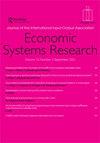A GRAS variant solving for minimum information loss: An erratum
IF 1.6
4区 经济学
Q2 ECONOMICS
引用次数: 0
Abstract
Junius and Oosterhaven (2003, hereafter J&O) proposed an information-theoretic approach, which they called “GRAS”, to solve the problem of adjusting matrices with negative entries. In Lemelin (2009), I demonstrated that the J&O target function was not equivalent to Kullback-Leibler’s (1951, hereafter K-L) cross-entropy measure. In fact, I reformulated the problem using K-L’s cross-entropy to show that the reformulated problem yields a different solution. In addition, my paper extended the approach to adjustment problems, intractable via GRAS, where row sums, column sums or both are constrained to zero. The world table of country international investment positions (IIP) is an example: the worldwide sum of assets, minus liabilities, of any given category (row sums) must be zero; but individual countries’ net worth, or IIP (column sums), may be positive or negative. I illustrated this in Table 6. Unfortunately, that table was not the one that I used to generate Tables 7 and 8. As a matter of fact, given the sign-preserving property of the adjustment procedure, Table 6 is incompatible with results displayed in Tables 7 and 8. This error was mine. The proper table is now displayed here. All other numerical examples presented in Lemelin (2009) are correct.求解最小信息损失的GRAS变式:勘误
Junius和Oosterhaven(2003,以下简称J&O)提出了一种信息论方法,他们称之为“GRAS”,以解决具有负项的矩阵调整问题。在Lemelin(2009)中,我证明了J&O目标函数不等价于Kullback-Leibler(1951,以下简称K-L)的交叉熵测度。事实上,我用K-L的交叉熵重新表述了这个问题,以表明重新表述的问题产生了不同的解。此外,我的论文将该方法扩展到了通过GRAS难以解决的调整问题,其中行和、列和或两者都被约束为零。国家国际投资头寸世界表就是一个例子:任何给定类别的资产减去负债的全球总和(行总和)必须为零;但个别国家的净资产(IIP)可能是正的,也可能是负的。我在表6中对此进行了说明。不幸的是,那个表不是我用来生成表7和表8的那个表。事实上,考虑到调整过程的符号保持特性,表6与表7和表8中显示的结果不兼容。这个错误是我的。正确的表格现在显示在这里。Lemelin(2009)中给出的所有其他数值示例都是正确的。
本文章由计算机程序翻译,如有差异,请以英文原文为准。
求助全文
约1分钟内获得全文
求助全文
来源期刊

Economic Systems Research
ECONOMICS-
CiteScore
5.60
自引率
4.00%
发文量
17
期刊介绍:
Economic Systems Research is a double blind peer-reviewed scientific journal dedicated to the furtherance of theoretical and factual knowledge about economic systems, structures and processes, and their change through time and space, at the subnational, national and international level. The journal contains sensible, matter-of-fact tools and data for modelling, policy analysis, planning and decision making in large economic environments. It promotes understanding in economic thinking and between theoretical schools of East and West, North and South.
 求助内容:
求助内容: 应助结果提醒方式:
应助结果提醒方式:


